2015年3月托福真题回忆及解析
【导语】有志者,事竟成,破釜沉舟,百二秦关终属楚;苦心人,天不负,卧薪尝胆,三
千越甲可吞吴。永不满足是我向上的动力。 以下是无忧考网小编为你搜集整理的2015年3
月部分托福真题,希望可以对你有所帮助!2018年3月托福共举行了三场考试分别是3月7
日、3月14日、3月28日
3 月 7 日托福考试写作真题回忆:
第一套:
Taking children to field trips( for example, to a museum) is a better
way of education than learning at school in a classroom.
这道题目是一个比较对比类的题目。此类题目在托福写作中是非常常见的。对于这
类题目,我们应该注意的是,在分论点的展开过程中,应该每一段都体现出题目中两
个对象的比较和对比。另外,此题属于校园生活类话题,在历年的托福考题中也并不
鲜见,难度并不大。
例文:
People have always been looking for effective ways to educate our
children, who determines the future of a nation. In that case, some
original and creative teachers start their classes with field trips,
which I believe is a better way than learning at school in a classroom
in educating students.
In the first place, going on field trips enables the students to study
actively and positively. The unknown excitement and adventures of field
trips can always attract the students as it is the nature of them to be
curious about the events that they rarely or never experienced. Before
the trips, they will be so curious that they will do research on the
destinations, looking for their origin and history. And that
�
helps with the ability to gain information from a variety of approaches,
libraries, magazines, TV programs, the internet, and so forth. Conversely, in
normal everyday classes, the students have to study what the textbooks and
teachers tell them, where there exists no internal motivation, which is an
essential part for efficient learning. we can see that the traditional
classrooms creates passive learning, whereas the field trips contributes more
to active learning.
In addition, the active learning resulting from out-of-classroom
activities lasts longer than passive learning and helps the students
understand the theories and principles better. As different field trips
possesses different excitement, students curiosity never reduces. On the
other hand, young people can
study better by witnessing how the theories and principles work and how great
the masters’ works are.
Students remember things when they are experiencing in person instead of
listening to stories in normal classrooms.
I admit that there might be some disadvantages on the field trips, which
classrooms do not have. It might be hard for the teachers to put the
students in order and ensure their security. But as long as we have enough
teachers taking care of them on the trip and tell them to obey the rules,
the students will be easy to deal with and we can minimize the possibility
of danger. As a result, we cannot sacrifice the beauty of field trips
because of the problems that we can handle.
�
To sum up, the benefits that field trips can bring is evident and
schools should provide more opportunities for the students to go on the
trips. In this way, the students will be more active in learning and the
study efficiency will be improved and they will create a more beautiful
world for us, using the knowledge they obtained on campus.
第二套:
People will spend less time in cooking and preparing for food in 20 years.
Do you agree or disagree.
此题是一道典型的时间对比类题目,考察的是今明对比,考生选择同一或不同意都
比较好想出理由点, 此题的难度也不大。
如果同意可以讲:1,生活节奏加快,人们忙于工作;2,高科技厨具的发明,减少了
做饭时间;3,人们生活水平提高了,更愿意买饭,因为更美味。
如果不同意可以讲:1,做饭是一件快乐的事,是减轻压力释放心情的好方法;2,人
们不用忙于工作了, 更有时间做饭;3,自己做得更健康,更卫生。
例文:
The most unforgettable memories in my childhood was when I sat in the
kitchen and watch my mother cook delicious food for me. While cooking, she
usually tells me stories and the philosophy of life of those stories.
Until today, she cooks for me in the way she did when I was little.
However, in twenty years from
now, society will undergo great changes and so will people’s cooking habits.
They wonderful cooking
moments will not appear and people will spend less time in cooking.
In the first place, the development of technology allows people to reduce
�
the time spent in cooking and preparing for food, which can be predicted
through what is happening now, compared with what it was in the past. Today,
we have microwave ovens, electromagnetic ovens, blenders and many other
cookers to accelerate the cooking process. What took hours hours for us to
prepare costs only a few minutes. So we can safely say that in twenty years
from now, the technology will be more advanced and continue to help us
reduce the time for cooking. And the new equipment will be widely welcomed.
In addition, the speed at which people live will increase and people
will be busier. With the increment of human population, the job market
will be more and more fierce. In order not to get swept out of the work
place, people will have to devote more to their work and leave less time
for other activities in life,cooking, for example. And this is the reason
why I mentioned the popularity of new cooking devices in the last
paragraph.
Using the advanced cooking devices is not the only way that people use
to deal with the complicated work. Also, deep down in their mind, they
will love to buy whatever they think is delicious to reward themselves
for the sacrifice in work. They have already worked hard enough to make a
living and the dishes from good restaurants, which are more delicious
than the one cooked by themselves, is exactly what they deserve. Thus, it
is evident that they will cook or prepare food by themselves less.
Admittedly, some food in restaurants is not healthy enough and is
�
sometimes not clean. But I believe that, in twenty years, the supervision
of the government will be more comprehensive and we can minimize this
kind of problem.
How you cook or whether you cook or not does not matter. What really
matters is the health and happiness. So choosing a healthier way to cook
and eat is essential for the future happiness, which we all pursue.
第一套
第一章
Colonial America and Navigation Acts
讲英国对殖民地推行的Navigation Acts ,有出口法律限制小商品批发之类的
解析:本文属于历史类文章,关注殖民政策。在之前的 TP0 文章中少有类似内 容,
但是跟经济相关的文章还是有的。从机经要点词来看,内容不太难,但是从 之前的
TP0 文章判断,历史经济类文章,通常句长偏长,而且阅读时易做脑补, 对学员的句
法能力是较大的一个挑战,建议还是平时扎实基本功。
参考阅读:
Throughout the colonial period, after the middle of the seventeenth century,
the one great source of irritation between the mother country and her
colonies was found in the Navigation Acts. The twofold object of these acts
was to protect English shipping, and to secure a profit to the home country
from the colonies. As early as the reign of Richard II steps had been taken
for the protection of shipping, but not before 1651 were there any British
statutes that seriously hampered colonial trade. The Long Parliament in
1642, exempted New England exports and imports from all duties, and a few
�
years later all goods carried to the southern colonies in English vessels
were put on the free list
In 1651, however, while Cromwell was master of England, the first of the
famous Navigation Acts was passed. The chief provisions were, that no goods
grown or manufactured in Asia, Africa, or America should be transported to
England except in English vessels, and that the goods of any European
country imported into England must be brought in British vessels, or in
vessels of the country producing them. The law was directed against the
Dutch maritime trade, which was very great at that time. But it was nowhere
strictly enforced, and in New England scarcely at all.
In 1660 the second of these memorable acts was passed, largely embodying
the first and adding much
to it This act forbade the importing into or the
exporting from the British colonies of any goods except in English or
colonial ships2 and it forbade certain enumerated articles -- tobacco,
sugar, cotton, wool, dyeing woods, etc. -- to he shipped to any country,
except to England or some English plantation. Other goods were added at a
later date. Such goods were to pay heavy duties when shipped to England,
and in 1672 the same duties were imposed on goods sold from one colony to
another. Had these laws been strictly enforced, the effect on the colonies
that produced the "enumerated" articles would have been disastrous, for
they enjoyed a flourishing trade in these goods with other countries. Other
articles, such
as grain, salt provisions, and fish, were not put on the
�
list, because these were produced in England, and, had the entire colonial
production been sent to that country, the English producer would have been
ruined.3 Rice was also allowed to be shipped direct to all ports south of
Cape Finisterre. Some things, however, the Parliament did purely to favor
the colonies,-- it prohibited the raising of tobacco in England and kept
Spanish tobacco out by high duties, it kept out Swedish iron by a high
tariff, to the advantage of the colonies, and it paid a bounty on various
colonial products.
In addition to these laws there were two other classes of laws, all,
however,
belonging
to
the
same
system,
which
tended
to
impede
the
development
of
the
colonies,
?the
corn
laws
and
the
laws
against
manufacturing. The corn laws in the interest of the British farnier,
beginning about 1666, practically shut out from England grain raised in the
colonies. This drove New England and New York to manufacturing, and this
again led England to forbid manufacturing in the colonies. These laws were
far more effective than the Navigation Acts. It is stated that in 1708 New
York manufactured three fourths of the woolen and linen goods used in the
colony, and also fur hats in great numbers, many of which were shipped to
Europe and the West Indies. This trade was largely suppressed by English
laws passed at various times. In 1732 an act forbade the exporting of hats
to England, to foreign countries, or from one colony to another. It also
limited the number of persons a maker of hats might employ. Iron was found
in all the colonies, and forges and furnaces were established in many
�
places. But in 1750 Parliament enacted a
law declaring that "no mill or other engine for rolling or slitting iron/'
"nor any furnace for making steel shall be erected in the colonies"! After
this only pig and bar iron could be made. Parliament also enacted laws at
various times restricting the manufacture of woolen goods. These laws bore
heavily on the northern colonies, but were little felt in the South, where
manufactories were rare.
Probably the harshest of England's laws in the suppression of colonial
trade was the Molasses Act of 1733. By this act prohibitive duties were
placed on molasses and sugar, from the French West Indies to the colonies.4
New England enjoyed a great trade with the islands, receiving molasses and
sugar for flour, stock, lumber, and fish, part of which could not be sold
to England owing to the corn laws. Had the Molasses Act been enforced, the
prosperity of New England would have been at an end.
第二篇:
Mass Production: Method and Impact
讲工业革命造成产品过剩,通过广告和其他一些手段推销产品
解析:本文属于历史类文章,关注的是工业革命与广告的问题。在 TP0 里有很 多关
于工业革命的内容, 多讲述能量相关内容,还有关注工人地位的,也有关注 广告
的,例如Children and Advertising ,而工业革命与广告联系还是首次提到,但是从
机经关键词判断,难度适中,学员仅需重点关注不同手段的目的即可。
参考阅读:
The economies of mass production come from several sources. The primary
cause is a reduction of nonproductive effort of all types. In craft
�
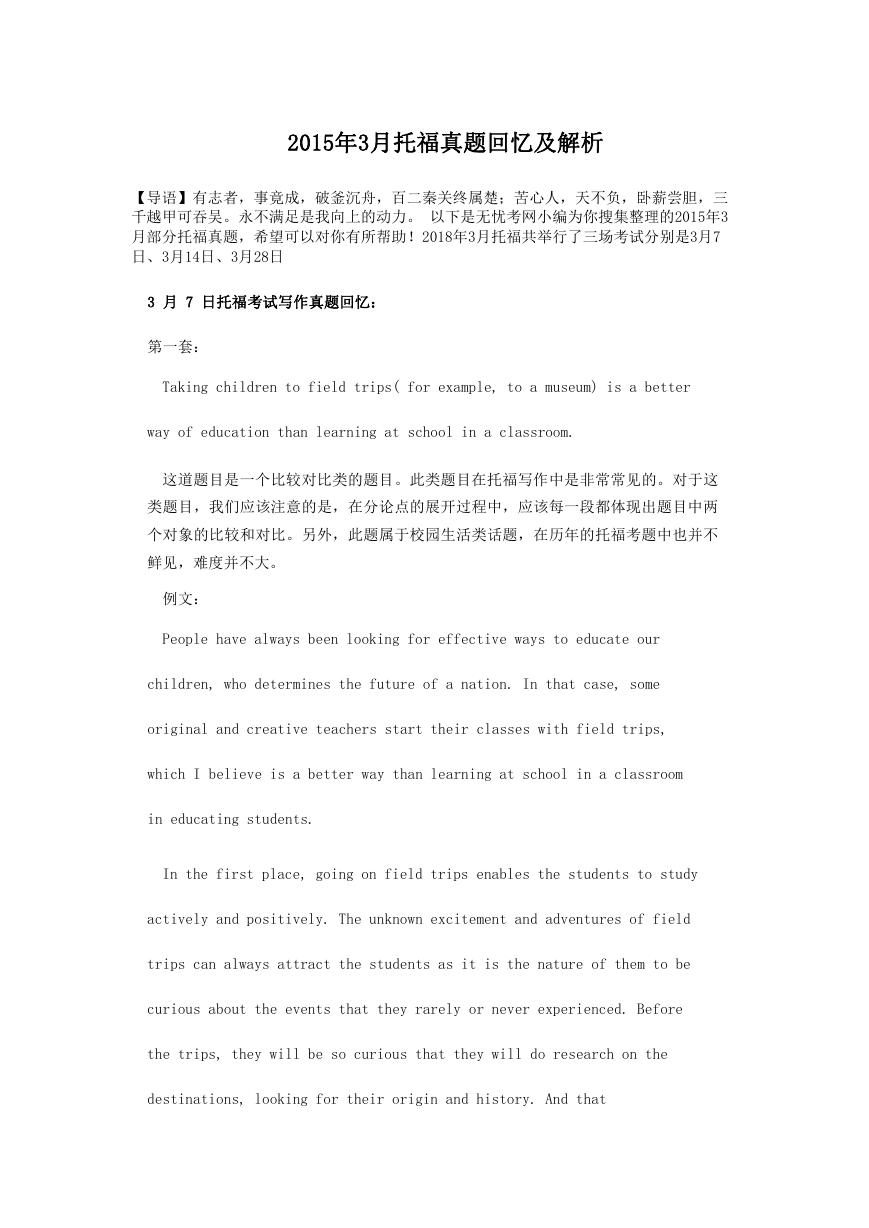
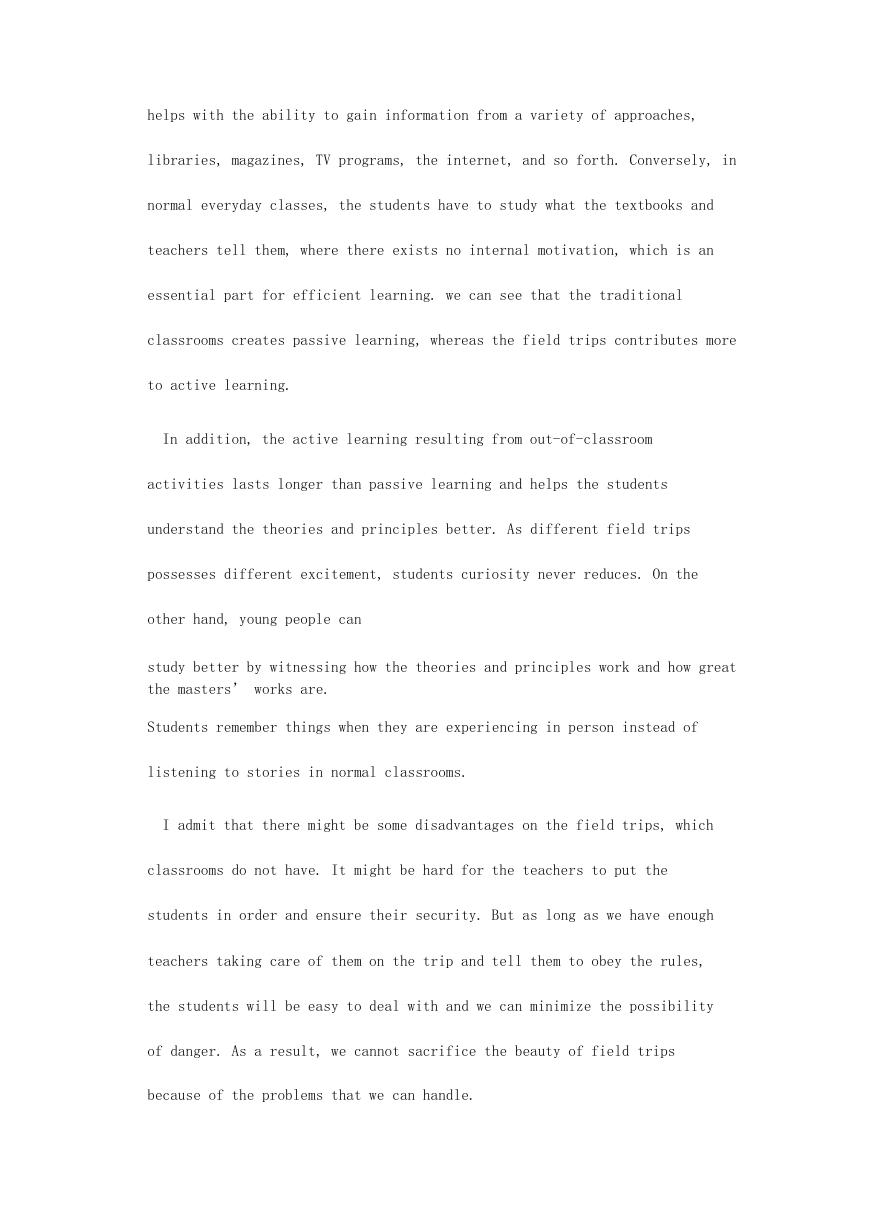
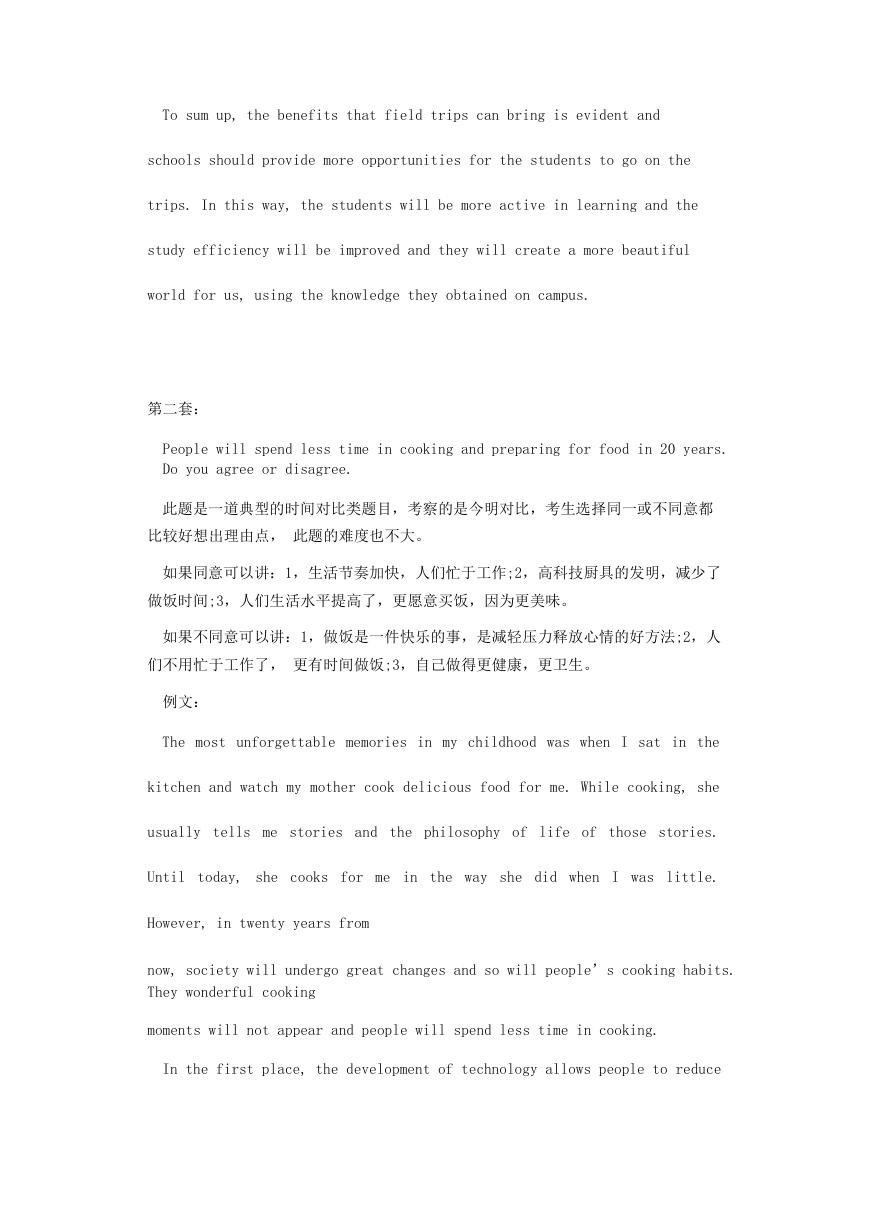
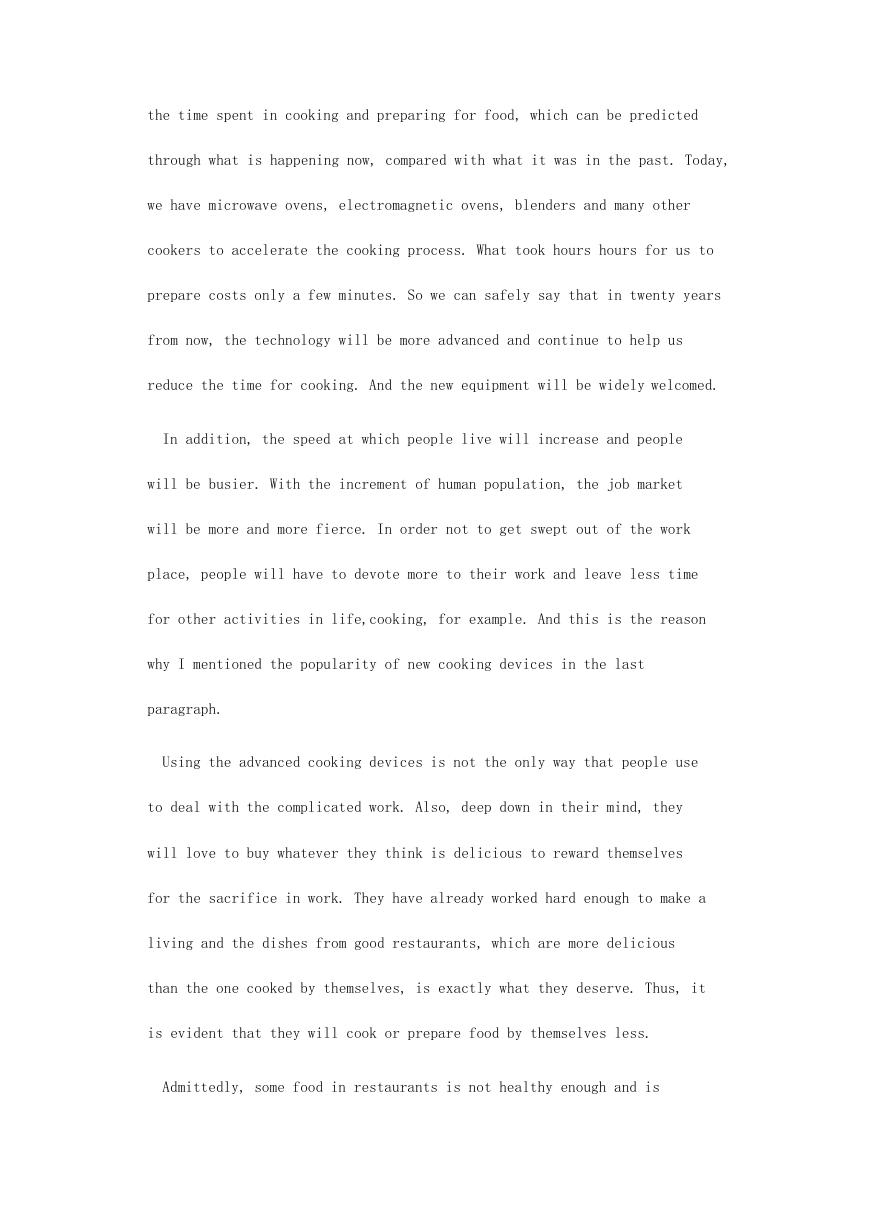
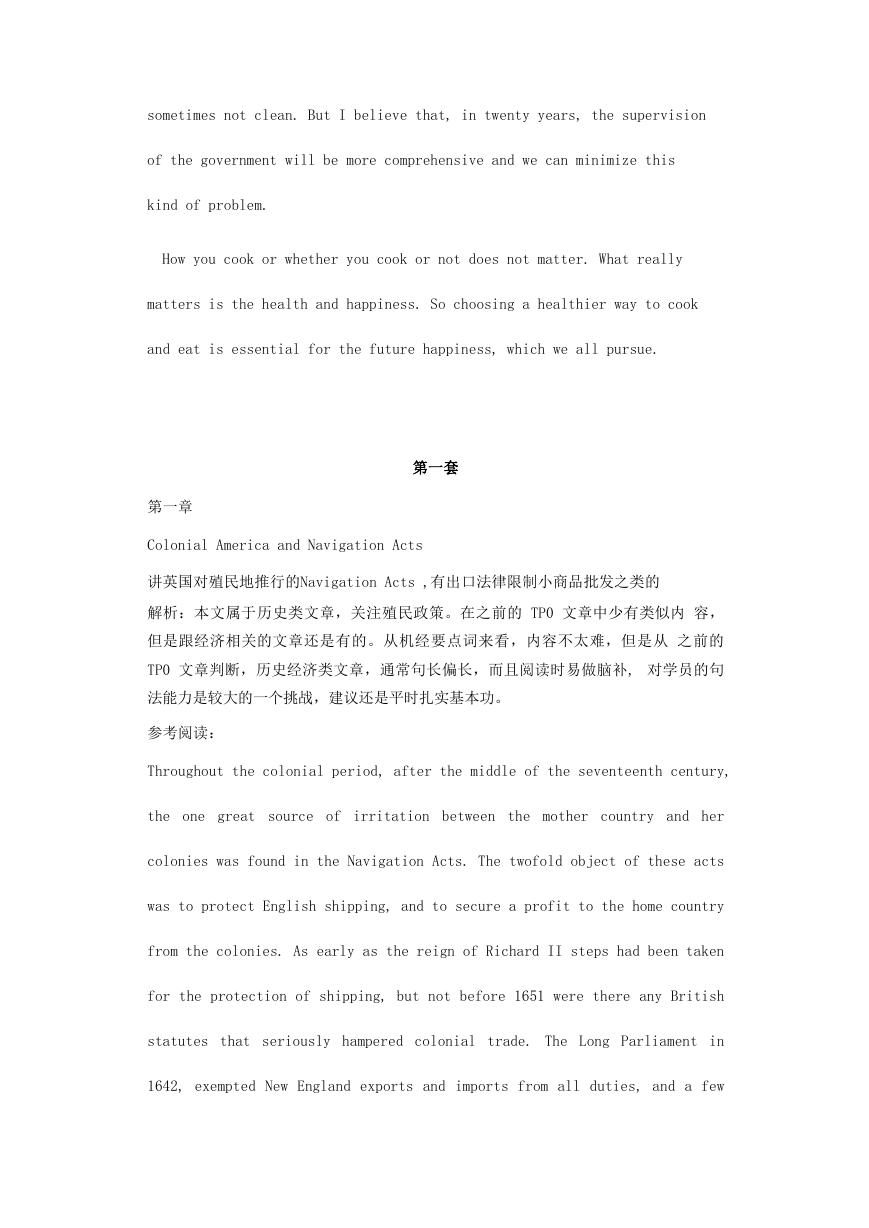
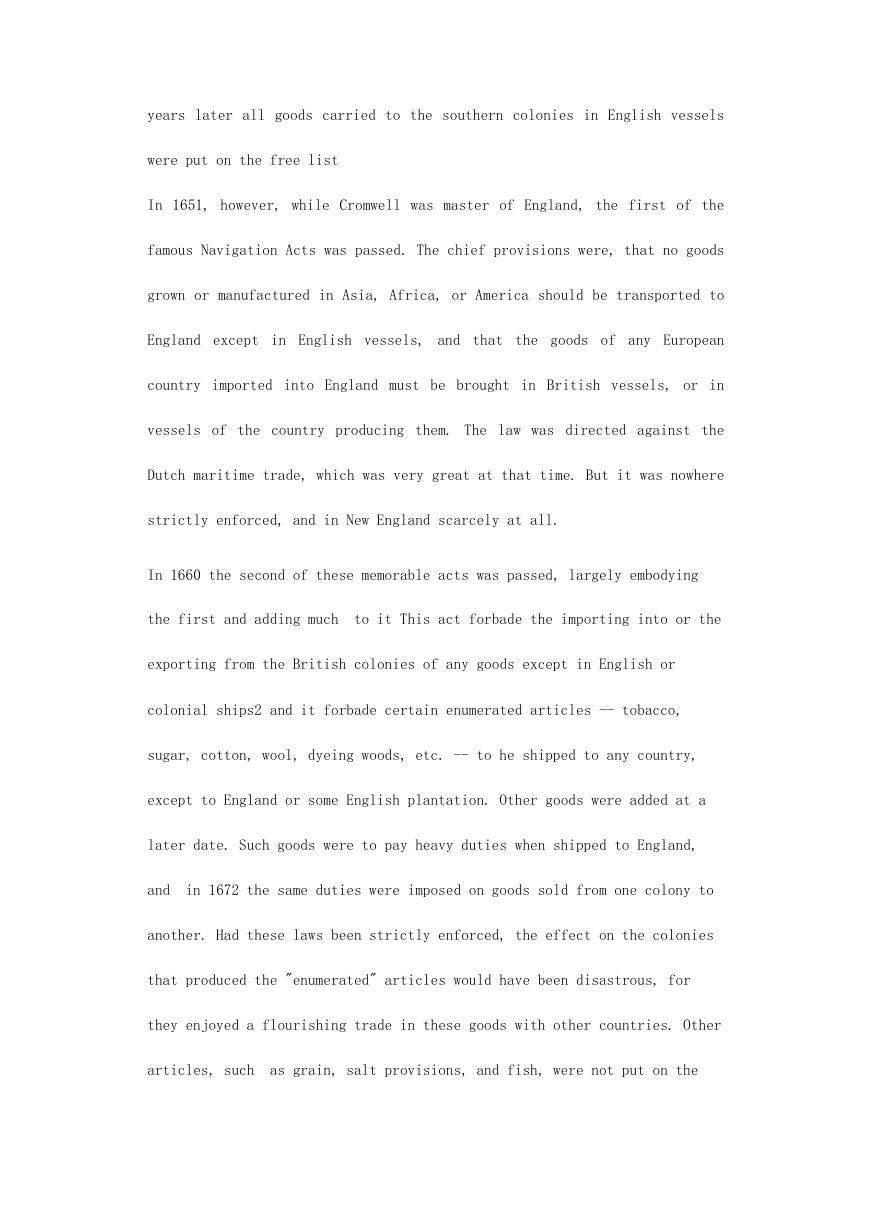
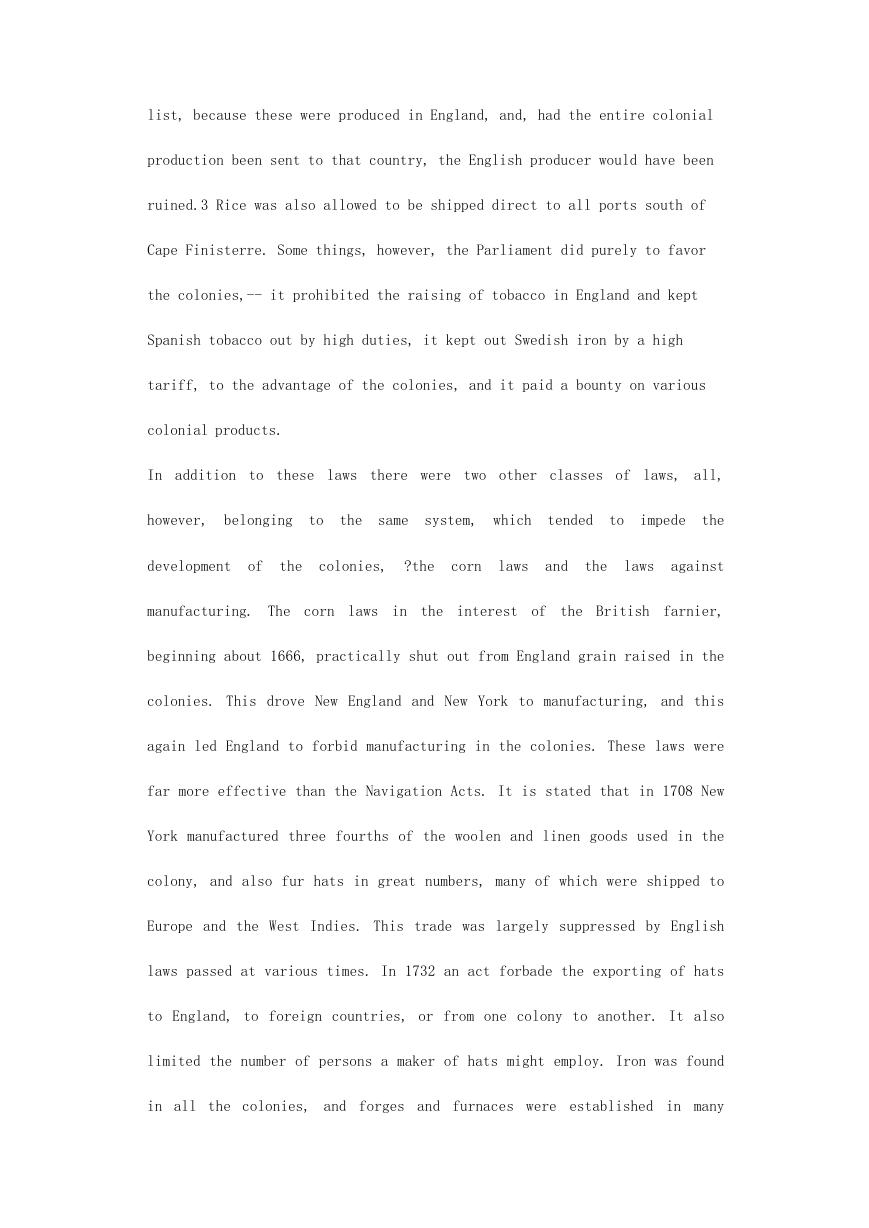
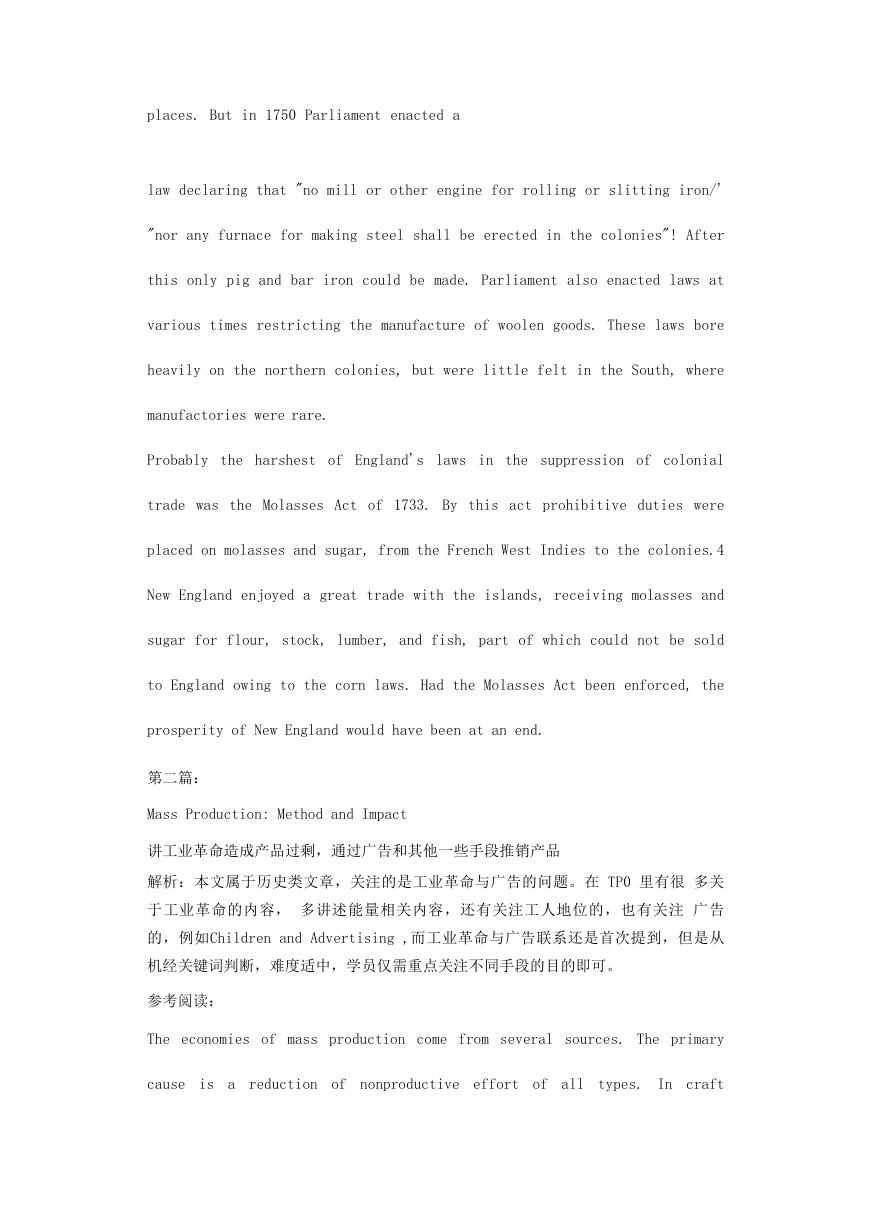








 2023年江西萍乡中考道德与法治真题及答案.doc
2023年江西萍乡中考道德与法治真题及答案.doc 2012年重庆南川中考生物真题及答案.doc
2012年重庆南川中考生物真题及答案.doc 2013年江西师范大学地理学综合及文艺理论基础考研真题.doc
2013年江西师范大学地理学综合及文艺理论基础考研真题.doc 2020年四川甘孜小升初语文真题及答案I卷.doc
2020年四川甘孜小升初语文真题及答案I卷.doc 2020年注册岩土工程师专业基础考试真题及答案.doc
2020年注册岩土工程师专业基础考试真题及答案.doc 2023-2024学年福建省厦门市九年级上学期数学月考试题及答案.doc
2023-2024学年福建省厦门市九年级上学期数学月考试题及答案.doc 2021-2022学年辽宁省沈阳市大东区九年级上学期语文期末试题及答案.doc
2021-2022学年辽宁省沈阳市大东区九年级上学期语文期末试题及答案.doc 2022-2023学年北京东城区初三第一学期物理期末试卷及答案.doc
2022-2023学年北京东城区初三第一学期物理期末试卷及答案.doc 2018上半年江西教师资格初中地理学科知识与教学能力真题及答案.doc
2018上半年江西教师资格初中地理学科知识与教学能力真题及答案.doc 2012年河北国家公务员申论考试真题及答案-省级.doc
2012年河北国家公务员申论考试真题及答案-省级.doc 2020-2021学年江苏省扬州市江都区邵樊片九年级上学期数学第一次质量检测试题及答案.doc
2020-2021学年江苏省扬州市江都区邵樊片九年级上学期数学第一次质量检测试题及答案.doc 2022下半年黑龙江教师资格证中学综合素质真题及答案.doc
2022下半年黑龙江教师资格证中学综合素质真题及答案.doc